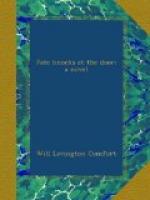These were his sole adventures in music, but they had bound his dreams together. He had felt, if the right person were near, he could have made music tell things, not to be uttered in mere words; and under the magic of certain songs, that which was creative within him, even dim and chaotic, stirred and warmed for utterance.... So fresh a surface did Bedient bring to the Carreras music-room.
The time had come when his nature hungered for great music. The orchestrelle added to the Island something he needed soulfully. Experimenting with the rolls, the stops and the power, he found there was nothing he could not do in time. Music answered—trombone, clarionet, horn, bassoon, hautboy, flute, ’cello answered. Volume and tempo were mere lever matters. On the rolls themselves were suggestions. Reaching this point, his exaltation knew no bounds. He looked upon the great array of rolls—symphonies, sonatas, concertos, fantasies, rhapsodies, overtures, prayers, requiems, meditations, minuets—and something of that rising power of gratitude overcame him, as only once before in his life—when he had realized that the Bible was all words, and they were for him. From the first studious marvellings, Bedient’s mind lifted to adoring gratefulness in which he could have kissed the hands of the toilers who had made this instrument answer their dreams. Then, he fell deeply into misgiving. It seemed almost a sacrilege for him to take music so cheaply; that he had not earned such joy. But he could praise them in his heart, and he did with every sound.
The orchestrelle unfolded to a spirit like this. Doubtless his early renderings of random choice were weird, but more and more as he went on, the great living things righted themselves in his consciousness, for he had ear and soul and love for them. Some great fissure in his nature had long needed thus to be filled. He sent for books about the great composers; descriptions of the classics; how the themes were developed through different instruments. Then he wanted the history of all music; and for weeks his receptivity never faltered. No neophyte ever brought a purer devotion to the masters. His first loves—the Andante in F, the three movements of the Kreutzer Sonata, a prayer from Otello, the Twelfth Rhapsody, the Swan Song and the Evening Star, and finally Isolde’s Triumph over Death—these were ascendings, indeed—to the point of wings.




